Biography reveals Steve Jobs’ take on Android, cancer, Bill Gates
- Share via
A new biography of Steve Jobs is revealing new details of the Apple Inc. co-founder’s youth, his battle with cancer, his relationship with his biological parents and his unvarnished feelings about his rivals at Google Inc. and Microsoft Corp.
Scheduled for release Monday, “Steve Jobs” by Walter Isaacson is the result of more than 40 interviews with Jobs by the author over a period of years, including one just weeks before his death two weeks ago.
Jobs regretted waiting nine months to have an operation to remove cancer from his pancreas, the book reveals, a delay that probably allowed the cancer to spread.
Isaacson asked Jobs why he waited to get the surgery.
“And he said, ‘I didn’t want my body to be opened.... I didn’t want to be violated in that way,’” Isaacson told Steve Kroft of “60 Minutes,” which will air a story about the book Sunday.
“I think that he kind of felt that if you ignore something, if you don’t want something to exist, you can have magical thinking. It’d worked for him in the past. He regretted it.”
Jobs also had unwitting contact with his biological father, Abdulfattah “John” Jandali, a Syrian immigrant who is now a casino manager in Reno. Though the two never realized each other’s identities at the time, Jobs apparently ate years ago at a restaurant Jandali managed — and found out only later, after he learned the identities of his biological parents.
“When I was looking for my biological mother, obviously, you know, I was looking for my biological father at the same time, and I learned a little bit about him and I didn’t like what I learned,” Jobs told Isaacson. “I asked her to not tell him that we ever met ... not tell him anything about me.”
Jobs has few kind words for the executives who succeeded him after his first reign at Apple ended in 1985, and who nearly ran the company into the ground by the times Jobs returned in 1997.
In the book, he refers to members of the Apple interregnum as “corrupt people” with “corrupt values,” according to excerpts reviewed by the Associated Press. That group was obsessed with profit — “for themselves mainly, and also for Apple — rather than making great products.”
Jobs told Isaacson that Jonathan Ive, the company’s head designer and a man Jobs called his “spiritual partner,” was among his most powerful successors. Ive had “more operation power” than anyone at Apple besides Jobs — which was the way Jobs “set it up.”
The book also offers some insight into Apple’s current patent battles with Google and makers of its Android phones, which he believed ripped off the design and functionality of Apple’s blockbuster iPhone.
“I will spend my last dying breath if I need to, and I will spend every penny of Apple’s $40 billion in the bank, to right this wrong,” Jobs said, according to the AP report. “I’m going to destroy Android, because it’s a stolen product. I’m willing to go thermonuclear war on this.”
Jobs also had some parting barbs for Bill Gates, the Microsoft co-founder and Jobs’ longtime business rival and, later, friend. “Bill is basically unimaginative and has never invented anything, which is why I think he’s more comfortable now in philanthropy than technology,” Jobs said of Gates. “He just shamelessly ripped off other people’s ideas.”
More to Read
Inside the business of entertainment
The Wide Shot brings you news, analysis and insights on everything from streaming wars to production — and what it all means for the future.
You may occasionally receive promotional content from the Los Angeles Times.










